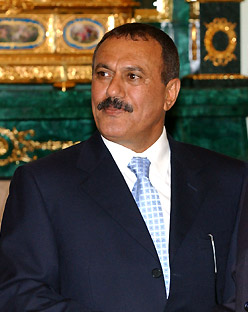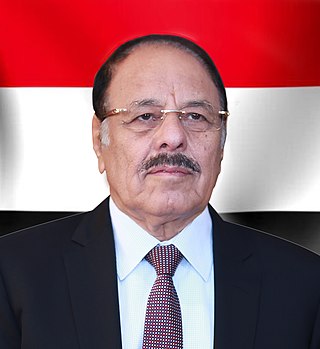Related Research Articles

The Armed Forces of Yemen are the military forces of the Republic of Yemen. They include the Yemeni Army, Yemeni Navy and the Yemeni Air Force. The capital of the country, Sana’a is where the military is headquartered. Per the constitution of Yemen, the President of Yemen serves as the commander-in-chief.

Ali Abdullah Saleh al-Ahmar was a Yemeni politician who served as the first President of Yemen, from Yemeni unification on 22 May 1990 to his resignation on 25 February 2012, following the Yemeni Revolution. Previously, he had served as President of the Yemen Arab Republic, or North Yemen, from July 1978 to 22 May 1990, after the assassination of President Ahmad al-Ghashmi.

Edmond Amran El Maleh was a Moroccan Jewish writer of Berber extraction.
The Houthi insurgency in Yemen, also known as the Houthi rebellion, the Sa'dah War, or the Sa'dah conflict, was a military rebellion pitting Zaidi Shia Houthis against the Yemeni military that began in Northern Yemen and has since escalated into a full-scale civil war. The conflict was sparked in 2004 by the government's attempt to arrest Hussein Badreddin al-Houthi, a Zaidi religious leader of the Houthis and a former parliamentarian on whose head the government had placed a $55,000 bounty.

Sanaa, also spelled Sana'a or Sana, is the capital and largest city in Yemen and the centre of Sanaa Governorate. The city is not part of the Governorate, but forms the separate administrative district of "ʾAmānat al-ʿĀṣima". Under the Yemeni constitution, Sanaa is the capital of the country, although the seat of the Yemeni government moved to Aden, the former capital of South Yemen in the aftermath of the Houthi occupation. Aden was declared as the temporary capital by President Abdrabbuh Mansur Hadi in March 2015.

The Yemeni Revolution (intifada), also known as the Yemeni Revolution of Dignity followed the initial stages of the Tunisian Revolution and occurred simultaneously with the Egyptian Revolution of 2011 and other Arab Spring protests in the Middle East and North Africa. In its early phase, protests in Yemen were initially against unemployment, economic conditions and corruption, as well as against the government's proposals to modify Yemen's constitution. The protesters' demands then escalated to calls for the resignation of Yemeni President Ali Abdullah Saleh. Mass defections from the military, as well as from Saleh's government, effectively rendered much of the country outside of the government's control, and protesters vowed to defy its authority.
Wajdi al-Ahdal is a Yemeni novelist, short story writer and playwright. Laureate of the International Prize for Arabic Fiction (IPAF) in 2008, is known for his contemporary literary style and sometimes socially critical works, some of which have been censored in Yemen. Until 2019, he has published five novels, four collections of short stories, a play and a film screenplay.
Nadia Al-Kokabany is a Yemeni novelist, short story writer and academic. She was born in Taiz and studied architecture at Sanaa University. She completed a PhD in architecture at Cairo University in 2008, before returning to take up an academic position at Sanaa University.
Ahmed Amran is a Yemeni writer. He has a PhD in mineral exploration and mining. In 2000, he published a short story collection titled A New Horizon for a Newer World. A story from that book was translated into Italian, and included in a 2009 anthology of Yemeni literature called Perle dello Yemen.
Abd al-Karim al-Razihi is a Yemeni poet. His first book of poems was titled The Need for a Second Heaven and an Additional Hell. He worked at the Yemeni Ministry of Culture in Sanaa, and edited the magazine Al-Yaman al-Jadid.
Zayd Salih al-Faqih is a Yemeni short story writer, journalist and essayist. He was born in a village in Ibb Governorate in 1964, and studied Arabic language at Sanaa University. He then continued his studies at the University of Dhamar. He worked at the Yemeni ministry of culture, becoming the head of press and communication. He has published a number of short story collections, including Awtar li-awridat al-ghubar and Qunut (Obedience). He has also served as the secretary general of the Yemeni Writers' League.
Yasir Abdel Baqi is a Yemeni novelist, screenwriter, journalist and author. He was born in Aden and studied history and antiquities at university. His first book of short stories was called Ahlam (Dreams) followed by a collection called Night Woman. His controversial novel Zahavar appeared in 2008.
Samir Abdel Fattah is a Yemeni short story writer, novelist and playwright. He was born in Jibla, Yemen in 1971, and he moved to Sanaa in 1982, where he studied economics and business at university. He is known for his short story collections, the first of which, Ranin al-matar, appeared in 2002. He has published two more collections since. He has written two novels: Riwayat al-Sayyid Mim (2007) and Ibn al-nasr (2008). He has also written plays for the theatre.

Ali Mohsen Saleh al-Ahmar, sometimes spelled "Muhsin", is a Yemeni military officer who served as the vice president of Yemen from 2016 to 2022, when he was dismissed by President Abdrabbuh Mansur Hadi, who transferred the powers of the president and vice president to the Presidential Leadership Council. He is a general in the Yemeni Army and was the commander of the northwestern military district and the 1st Armoured Division. He played a leading role in the creation of the General People's Congress.
Hamid bin Abdullah bin Hussein al-Ahmar is a Yemeni politician currently living in exile after fleeing Yemen during the Houthi takeover of Sana'a September 2014. He is the former general secretary of the Preparatory Committee of the National Dialogue for the JMP and a member of opposition party Yemeni Congregation for Reform, commonly known as Islah.

The Battle of Sanaa was a battle during the 2011 Yemeni uprising between forces loyal to Yemeni leader Ali Abdullah Saleh and opposition tribal forces led by Sheikh Sadiq al-Ahmar for control of the Yemeni capital Sanaa and, on the part of the opposition, for the purpose of the downfall of president Saleh.

Sheikh Sadiq bin Abdullah bin Hussein bin Nasser al-Ahmar was a Yemeni politician and the leader of the Hashid tribal federation. He succeeded his father Abdullah ibn Husayn al-Ahmar in these positions after Abdullah's death in 2007. He is best known for his role in the 2011 Yemeni uprising, in which fighters under his command attacked and seized government facilities in the Battle of Sana'a.
Fares Mohammed Manaa is a top Yemeni arms-dealer, businessman, rebel commander and politician. He is said to be Yemen's most famous arms-dealer. Manaa was born on February 8, 1965 in the northern city of Saada. He was an ally of Yemeni President Ali Abdullah Saleh and member of his ruling GPC party and served as head of his presidential committee and as head of a local council tasked with mediating a peace-deal between the Yemeni government and Houthis during the Shia insurgency in Yemen. His brother was the governor of Saada Governorate at the time.
Mohamed el-Bisatie was an Egyptian novelist and short story writer.
Major General Mohammed Abdullah Saleh Afash was the first Chief of Staff of the Yemeni Central Security Forces and one of its leaders and the brother of former Yemeni President Ali Abdullah Saleh Afash. He died on 14 May 2001 in London and his body was transferred to Sanaa.
References
- ↑ Profile of al-Gharbi Amran in Yemen Times, 25 October 2010 Archived 24 November 2010 at the Wayback Machine
- ↑ Biographical note in Arablit website (translated from Italian)
- ↑ Profile of al-Gharbi Amran in Yemen Times, 25 October 2010 Archived 24 November 2010 at the Wayback Machine